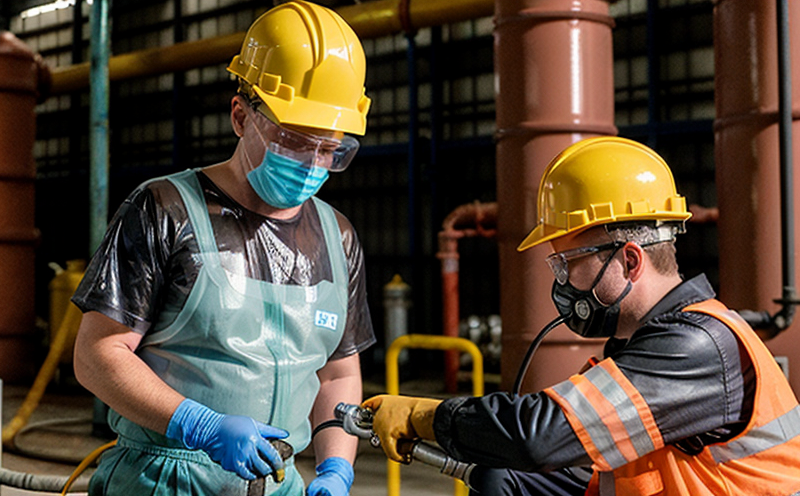Verifying that chemical products comply with industry regulations regarding corrosivity and material safety
Verifying Chemical Products Ensuring Compliance with Industry Regulations for a Safer Future
As the global chemical industry continues to grow and evolve, businesses are facing increasingly stringent regulations regarding the corrosivity and material safety of their products. In this complex landscape, it is essential for companies to verify that their chemical products comply with industry standards to avoid costly fines, reputational damage, and most importantly, ensure the health and safety of consumers.
At Eurolab, our laboratory services are designed to provide businesses with comprehensive verification solutions that guarantee compliance with regulatory requirements. Our expert team has extensive experience in testing and analysis, ensuring that your chemical products meet the highest standards for corrosivity and material safety.
The Importance of Verifying Chemical Products
In todays highly regulated environment, companies must prioritize product safety and ensure that their chemical products comply with industry regulations to avoid severe consequences. Non-compliance can result in
Financial penalties Fines and fees imposed by regulatory bodies can be substantial, draining company resources and impacting profitability.
Reputational damage Failure to meet regulatory requirements can damage a companys reputation, eroding customer trust and loyalty.
Product liability Companies may face lawsuits and financial claims related to product-related injuries or damages.
In contrast, verifying chemical products with industry regulations ensures
Compliance Companies can confidently operate within the law, avoiding fines and penalties.
Risk reduction By identifying potential hazards, companies can take proactive steps to mitigate risks and prevent accidents.
Improved reputation Demonstrating a commitment to safety and regulatory compliance enhances a companys reputation and fosters customer trust.
The Benefits of Verifying Chemical Products with Eurolab
Our laboratory services offer a range of benefits for businesses seeking to verify chemical products
Comprehensive testing Our experienced team conducts thorough analysis, ensuring that your products meet industry standards for corrosivity and material safety.
Customized solutions We tailor our services to meet the unique needs of each client, providing flexible and cost-effective verification solutions.
Expert interpretation Our experts provide detailed reports and recommendations, helping companies interpret test results and implement corrective actions.
Key Benefits of Verifying Chemical Products with Eurolab
Here are some key benefits of using our laboratory services
Peace of mind Companies can confidently operate within regulatory requirements, avoiding costly fines and reputational damage.
Improved product safety Our testing ensures that chemical products meet industry standards for corrosivity and material safety, protecting consumers and reducing the risk of accidents.
Enhanced reputation Demonstrating a commitment to safety and regulatory compliance enhances a companys reputation and fosters customer trust.
Cost savings By identifying potential hazards early on, companies can take proactive steps to mitigate risks, reducing costs associated with non-compliance.
QA Frequently Asked Questions about Verifying Chemical Products
Here are some frequently asked questions about our laboratory services
What types of chemical products do you verify?
How long does the testing process typically take?
Can you provide customized solutions for specific industries or product types?
Do you offer any certifications or documentation to support compliance?
How do I get started with your laboratory services?
Conclusion
Verifying chemical products is a critical component of ensuring industry compliance and protecting consumer safety. At Eurolab, our expert team provides comprehensive laboratory services designed to meet the unique needs of each client. By choosing our verification solutions, companies can confidently operate within regulatory requirements, reduce risks, and enhance their reputation. Contact us today to learn more about how we can help your business thrive in a safer future.
Additional Resources
Industry Regulations Guide(link)
Material Safety Testing Overview(link)
Corrosivity Testing Methodologies(link)
-
Testing chemicals for their ability to cause damage to metals, plastics, and other materials
-
Simulating exposure to corrosive chemicals to evaluate their impact on materials used in industrial applications
-
Determining the level of corrosion that a chemical can cause on different surfaces over time
-
Evaluating the effect of temperature, humidity, and pressure on the corrosivity of chemicals
-
Testing the corrosivity of chemicals used in cleaning agents, solvents, and industrial processes
-
Ensuring that chemicals used in manufacturing do not lead to the degradation of equipment or infrastructure
-
Testing for the presence of corrosive substances that could pose a threat to workers and the environment
-
Simulating long-term exposure to determine the corrosive effects of chemicals during storage and transportation
-
Evaluating the resistance of coatings and protective materials against corrosion caused by chemicals
-
Testing the effects of chemical spills and leaks on the corrosion of pipelines, tanks, and machinery
-
Assessing the corrosivity of chemicals under extreme environmental conditions such as high temperatures and pressures
-
Testing the interaction between chemicals and metallic components used in construction or automotive applications
-
Ensuring that materials exposed to chemicals are resistant to corrosion in critical industrial settings
-
Testing the effectiveness of corrosion inhibitors in preventing chemical damage to metal surfaces
-
Determining the corrosion rates of chemicals used in aggressive environments like offshore drilling and chemical processing
-
Evaluating the impact of exposure to moisture, salt, and other environmental factors on the corrosive properties of chemicals
-
Simulating exposure to chemicals in real-world environments to assess their potential to cause corrosion over time
-
Testing the pH levels of chemicals and their relationship to the corrosivity of substances on surfaces
-
Assessing the long-term impact of chemicals on the integrity of storage containers, pipes, and tanks
-
Testing the effect of chemical interactions on corrosion rates when chemicals are mixed with other substances
-
Ensuring that chemicals used in coatings and paints do not cause corrosion over time in various environmental conditions




